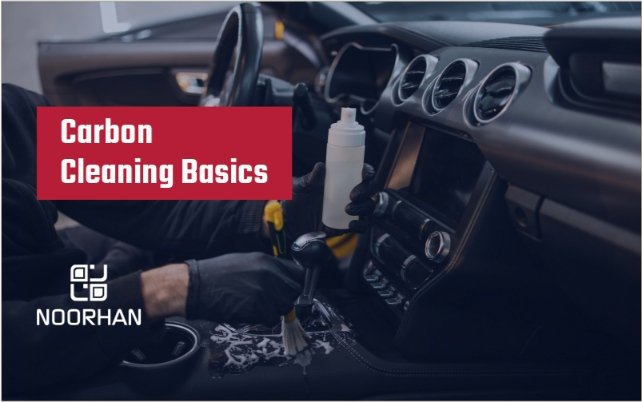-
What is Carbon Cleaning?What is Carbon Cleaning?
-
Is Carbon Cleaning Best for Your Car?Is Carbon Cleaning Best for Your Car?
-
Pros of Carbon CleaningPros of Carbon Cleaning
-
Cons of Carbon CleaningCons of Carbon Cleaning
-
Carbon Cleaning TechniquesCarbon Cleaning Techniques
-
Can Carbon Cleaning Damage Your Engine?Can Carbon Cleaning Damage Your Engine?
-
How Often to Carbon Clean?How Often to Carbon Clean?
-
Preventing Carbon BuildupPreventing Carbon Buildup
-
Is Carbon Cleaning Beneficial?Is Carbon Cleaning Beneficial?
If you want your new car to look and work like new for years or if you want to make your old car feel new again, you need to show it some tender loving care.
One major aspect of car upkeep that most of us often overlook is carbon cleaning. In this blog, we will talk about the whats, whys and hows of carbon cleaning while we try to make a case for it. If you don’t know about this issue or the benefits that come with carbon cleaning, this blog is for you.
What is carbon cleaning? Why does your car need it?
Every new car comes with a clean engine. But over time, a type of black soot starts forming inside your engine. This black soot is nothing but the result of incomplete fuel combustion and is also called ‘carbon buildup.’ And if you don’t clean this soot at regular intervals, it can choke up your engine bringing down your car’s fuel efficiency and performance.
Is carbon cleaning the best solution for your car?
Is carbon clearing a genuine solution or just a temporary patch to tackle a more serious issue of carbon emission & environmental health?
We are here to evaluate the benefits of carbon cleaning and the potential drawbacks to give you a clear picture.
Pros of carbon cleaning
1. Improved Performance: Engine carbon cleaning gives your car’s performance a breath of fresh air. The efficiency of an engine can be stifled over time by the buildup of carbon deposits inside. Your engine can get free from extra carbon with a carbon cleaning service, especially if your vehicle is old. By removing carbon deposits, carbon cleaning ensures that fuel can flow freely, resulting in improved fuel efficiency and better mileage.
2. Smoother Power Delivery: Carbon buildup can reduce engine efficiency, leading to jerky power delivery and a rough start. When you carbon-clean your engine, you make room for ideal combustion which results in smooth acceleration while improving the overall driving experience. Your car will respond to your orders more gracefully with a cleaner engine, making every ride more enjoyable.
3. Fewer Emissions: When your engine parts are clogged with black soot, your car uses more fuel to power the vehicle leading to increased emissions. Thus, cleaning the carbon deposits allows more air to flow into the engine so the fuel gets burned completely and less carbon is produced.
4. More Torque: Your vehicle’s performance depends heavily on engine torque, the rotating force that drives it. By removing carbon buildup and improving combustion, engine carbon cleaning revitalises torque. The outcome? Increased pulling power, more responsive acceleration, and a smoother driving experience all around.
5. Less Engine Vibration and Noise: An engine that is battling with carbon buildup can generate excessive vibration and noise. These distractions take away from a relaxing driving experience. The engine operates more smoothly and without any turbulence by getting rid of the carbon deposits. This decrease in noise and vibration gives a calm environment inside the cabin.
Cons of carbon cleaning
While we have argued that carbon cleaning has numerous benefits for your vehicle, let us be honest with you – it has certain downsides as well.
- The process of carbon cleaning is not a cheap one, especially when you are hiring a professional to get it done. Make sure you do a cost-benefit analysis to make sure you are getting your money’s worth.
- A faulty engine doesn’t always mean that there’s carbon buildup inside of it. Before you move forward and ask a professional for help, make sure that there are no other underlying factors contributing to your engine’s poor condition.
- One more thing that you need to know is that the results of this process depend largely on the technique that has been used. Not all techniques produce the same results.
- Last but not least, let’s not forget that certain carbon cleaning techniques include the use of chemicals. When used carelessly, these chemicals may damage engine parts.
To choose the best option for your car, you need to assess the benefits against the potential drawbacks. Or better yet, consult a professional for help.
Different types of carbon cleaning techniques: Explore your options
The automobile industry is growing more and more conscious of the effects of carbon emissions on the environment. Let’s explore the many techniques used in the process.
1. Cleaning with Chemical Carbon
This method of carbon cleaning involves using specially formulated chemicals. These chemicals are injected into the intake system to dissolve the carbon buildup on the valves, pistons and other engine parts. This is a non-invasive procedure which does not require engine dismantling. This is a favoured approach to recover lost power and fuel efficiency.
2. Cleaning using Hydrogen Carbon
In this technique, hydrogen gas is introduced into the intake system where it reacts with the carbon particles which generates heat and helps in breaking down carbon buildup. The loosened carbon particles then exit the engine through the exhaust system leaving the inner parts nice and clean. This is a more environment-friendly procedure but it won’t help much in the case of severe carbon buildup.
3. Blasting of walnut shells
Walnut blasting is a preferred method to remove stubborn carbon buildup. This approach utilizes crushed walnut shells as an abrasive material to clean engine parts. Finely crushed walnut shells are launched into the intake system where they move through the engine removing carbon buildup. Due to the special equipment and technical knowledge needed, this approach is normally carried out by specialists.
4. Cleaning the intake valve
This technique focuses on the part of the engine where carbon buildup is most noticeable. It involves dissolving and flushing away carbon deposits from the intake valves using a pressured solvent. In some severe cases, brushes and other tools might be used to remove stubborn carbon buildup.
Can carbon cleaning damage your engine?
Engine carbon cleaning is a perfectly safe technique that, when done properly, can increase the lifespan of your engine and avert mechanical problems. However, you run the danger of causing harm to your engine if you mess with it (by disassembling it or introducing harsh chemicals to the fuel mixture).
It is not advisable to disassemble your engine or add harsh chemicals to your fuel tank unless you are a skilled engineer (or are being recommended to do so by a professional). For these reasons, you should always consult a professional before making any modifications to your engine. Better still, visit a respected service centre and request that they remove the carbon buildup from your engine.
How often should you carbon clean your engine?
Your vehicle’s engine may require cleaning once or twice a year, depending on how frequently you use it and the local weather (i.e., urban/rural, wet/dry). These guidelines are not absolute, though; if you notice any problems like decreased fuel efficiency and knocking noises, you should pay closer attention to your car than the calendar.
If you live in a city and just sometimes drive your automobile, a yearly clean may be sufficient to maintain the health of your engine. On the other hand, if you frequently use your car and live in a dry climate, your automobile may have a substantial dust (and carbon) buildup and require more frequent cleaning.
How to prevent carbon buildup in engine?
Taking the best care of your engine is the easiest way to prevent carbon buildup.
Use only high-quality fuel: This one goes without saying. Using fuel with additives that support complete combustion results in less carbon buildup in engines. Several automakers advise consumers to use fuel additives that improve combustion.
Long car rides help: Longer trips on the highway are beneficial for your engine. Any activity that keeps your engine revving high for a long time can help remove any light carbon buildup. Those weekend trips every now and then can help your engine a lot.
Stay on top of engine maintenance: The greatest thing for your engine is routine maintenance. Follow the suggested maintenance schedule provided by the manufacturer for oil changes, air filter replacements, and spark plug inspections. Clean filters and fresh oil help ensure proper combustion, which lowers carbon accumulation over time.
Avoid excessive idling: Long-term idling enables carbon-rich exhaust gases to accumulate inside the engine, resulting in carbon deposits. Avoid leaving your engine running while at all possible. In addition to preventing carbon buildup, this also saves fuel and lowers pollutants.
Finally: Is Carbon Clearing Beneficial for Your Car?
Including carbon cleaning in your car’s maintenance routine will serve you well in the long run. Stripping your engine off of excessive carbon will optimize its performance, preserve fuel efficiency, reduce emissions, and will extend the lifespan of your beloved car.
If you wish to have a smoother driving experience while minimizing the chances of costly engine repairs in future, you should consider this life-saving option. Not to mention, you’ll also be doing your bit for the environment.
Where can you buy Best Auto Spare Parts in Dubai?
Auto Spare Parts are available at different suppliers and dealers of auto spare parts in Dubai. Noorhan is amongst the leading brands that deal with genuine auto spare parts and aftermarket parts for different car brands, including BMW, Mercedes, Audi, Porsche, Honda, Toyota, Nissan, Mazda, Jeep, Ford, and other Japanese, European, American, Korean, luxury cars brand.
If you’re looking to replace your old Auto Spare Parts with high-quality aftermarket parts in Dubai, Noorhan can help you.









